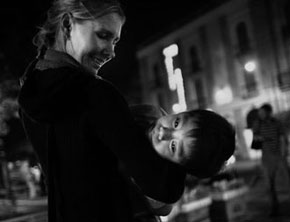A Calling
Danielle Strickland steers Mexican street children toward a better life
 Danielle Strickland '02 goes by a few nicknames in Guadalajara, Mexico. There's flaca, Spanish for "skinny." Or guera, slang for a light-skinned person. But when she takes her seat at a knee-high table in a library downtown, she is maira--the Mexican word for a companion-educator.
Danielle Strickland '02 goes by a few nicknames in Guadalajara, Mexico. There's flaca, Spanish for "skinny." Or guera, slang for a light-skinned person. But when she takes her seat at a knee-high table in a library downtown, she is maira--the Mexican word for a companion-educator.
With Tomas Trinidad (nickname: "chubby"), a friend and fellow mairo, she runs an after-school program for about eighty-five street kids, kindergartners to teenagers, who spend most evenings on the busy sidewalks and plazas of Mexico's second biggest city.
On a Monday afternoon last spring, these children gathered around Strickland with math homework and pages of reading. A few struggled to use their library voices.
"Nine minus zero," a first-grader named Ismael screamed in Spanish.
"Nine minus zero is the easiest of all," Strickland said gently.
These children come from cinderblock houses outside the city and from rented rooms downtown. They wear simple school uniforms and hand-me-downs. The older kids, some of the harder ones, have picked up bad habits of the city.
They are, Strickland says, in a "street situation."
To be poor and a child in Guadalajara carries a list of obligations: Go to work at an early age, skip your birthdays, wish only for small things.
But Strickland hopes the nonprofit she and Trinidad direct, called CODENI, an acronym that translates to Children's Rights Collective, will balance the pressures of the street and steer the kids toward a better life.
"Our work is preventive," she says after an evening at the library. "We want these kids to continue with an education to escape poverty."
When she talks about what she does, Strickland says it's a calling. She sees a need and knows she can fill it. Then she tells the story about Cancun.
When she was nine, Danielle's family took a vacation to the resort city. For a day trip, her parents rented a car and drove Danielle and her brother and sister away from the white-sand beaches. Stopped at an intersection outside Cancun, she saw them--children her own age with crumpled newspapers, offering to clean the car's windshield for pesos. That day was her introduction to poverty.
At Kenyon, Strickland majored in international studies, spending her junior year in both Guadalajara and Ecuador. Again, she was drawn to the street kids.
She brought a new sense of purpose back to Gambier her senior year. To keep up her vernacular Spanish, she did an internship in Columbus where she'd meet Latinos. She wrote a senior thesis on street education. By the September after her graduation, she was back in Guadalajara.
Her role there blends teacher and big sister, fundraiser and social worker. She has grown the CODENI street program from eight kids in 2004 to ten times that by the end of last year. The group now has a staff of a half dozen, including a psychologist, and hopes to raise $150,000, an imposing 1.5 million pesos, in 2008.
In Strickland's dreams for Guadalajara, an army of street educators finds all of the city's lost children, keeps them safe, and offers them normal childhoods. But during the work week, rewards are often smaller.
There are the sessions in the library. There are drives with Tomas Trinidad to Cerro del Cuatro, a trash-littered neighborhood in the hills. On one trip last spring, the two walked a group of kids to elementary school and, once there, convinced the gym teacher to let girls play in a soccer game. They made house calls as well, checking in on individual kids.
Then it was back down the hill, to a city full of children who need an advocate, along with some help with long division.
--Pete Dybdahl
Pete Dybdahl writes for the Roanoke (Virginia) Times, where this story first appeared. Readers can learn more about efforts to aid street children in Latin America at www.ahala.org, the website of American Hands Aiding Latin American Youth. The organization is a Virginia-based sister group of CODENI.
Do you have feedback on this page?
